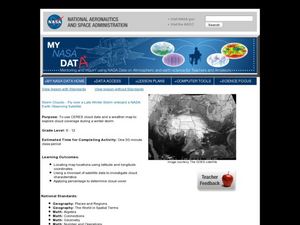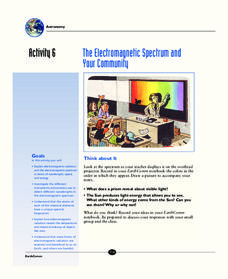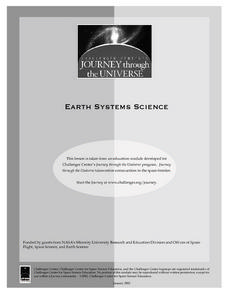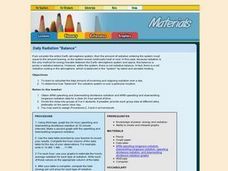TLS Books
Uranus
After reading an informational text passage, learners answer four multiple choice questions about the third largest planet in our solar system.
Curated OER
Storm Clouds-- Fly over a Late Winter Storm onboard a NASA Earth Observing Satellite
Students study cloud data and weather maps to explore cloud activity. For this cloud data lesson students locate latitude and longitude coordinates and determine cloud cover percentages.
National Wildlife Federation
The Amazing Adventures of Carbon: How Carbon Cycles through the Earth
Here's a stat for your pupils: 18 percent of the human body is carbon! Part 10 in the series of 12 takes pairs on an adventure through the carbon cycle. After a class reading about carbon, pairs read and choose their own adventure...
International Technology Education Association
Tidy Up Those Sloppy Force Fields!
It is just magnetic. This resource presents the concept of Earth's and another planet's magnetic field and how spacecrafts detect them. Learners study a problem using magnetometers and participate in three experiments to come up with a...
University of Colorado
Distance = Rate x Time
Every year, the moon moves 3.8 cm farther from Earth. In the 11th part of 22, classes use the distance formula. They determine the distance to the moon based upon given data and then graph Galileo spacecraft data to determine its movement.
It's About Time
The Electromagnetic Spectrum and Your Community
Do you have blossoming astronomers who seek to understand the electromagnetic spectrum? Assist them with exploring electromagnetic radiation and the electromagnetic spectrum as the class conducts various activities to demonstrate...
Colorado State University
Can it Really Rain Fish and Frogs?
You've heard of it raining cats and dogs ... but what about fish and frogs? It turns out, one scenario is much more likely than the other! Intrepid weather investigators examine the curious behavior of waterspouts using a leaf blower,...
Curated OER
Puzzle it Out
Students study the Earth's climatic system and construct a puzzle that names all of the pieces of the components involved. For this Climate lesson, students draw a picture on a puzzle piece depicting a specific component....
Curated OER
Microbes and Climate
Students examine how microbes play a role in the climate system. For this climate lesson students complete an activity, create a PowerPoint presentation and present it to the class.
Curated OER
Gallery Walk Questions about Energy and Material Cycles
Students state the physical, chemical or biological processes associated with these environments: Pelagic ocean zone, California coat Cave, Indiana Barrier island beach, North Carolina Sand dune, Dunes National Park, Colorado Wetland and...
Curated OER
Planetary Weather
Students study the weather on other planets in our solar system. In this planetary weather lesson students create a display of the different weather conditions on the other planets.
Curated OER
Biosphere Socratic Questions
High schoolers examine the origin of life on Earth and its evolution through geologic time by participating in a whole class discussion. They respond to prompts that lead them to conclusions about the interactions among the biosphere and...
Curated OER
The Air Around You
For this air worksheet, students will answer questions about the Earth's atmosphere, including the layers, air masses, and heat transfer. Students will explore how the difference in atmospheric temperature can create weather patterns....
Curated OER
What Makes you Hot?
Learners manipulate different variables in a model and make inferences about the temperature on Earth. In this heat lesson students calculate the blackbody radiation of an object at a certain temperature.
Curated OER
Weather: It Works, or Not?
Young scholars discover the techniques meteorologists use to examine the atmosphere. In groups, they build their own weather station and observe the various weather conditions. They identify the types of weather patterns that allow the...
Curated OER
Pangaea Puzzle
Students explore plate tectonics and the formations of the Earth's surface and why maps are distorted. In this Earth's surface instructional activity students complete a lab and answer questions.
Curated OER
Water in Earth's Hydrosphere
Environmentalists test stream water for temperature, pH, and turbidity. Each group shares their information and then the class makes an overall evaluation of the water quality. A slide show sets the backdrop for the teaching portion and...
Curated OER
Classroom Aquaponics: Exploring Nitrogen Cycling in a Closed System
Learners investigate nutrient cycling in a simplified desktop ecosystem involving aquarium and hydro-ponically grown plants. They set up an aquarium with 10 gallons of water at least a week before the lab is planned and place...
NOAA
Ocean Currents
Go with the flow! The eighth installment in a 13-part series has earth science students dive in to the world's system of ocean currents. The interactive illustrates the different types and depths of currents, how wind and gravity...
Curated OER
Climate in the Western Regions
Students examine the interactions of the Earth's systems and other objects in space. In this climate change lesson students study the pros and cons of different climates and what their preferences are.
Curated OER
Volcanoes And Atmospheres
High schoolers identify the volcano as the primary source of atmospheric gases, to explain the formation of ozone, and to recognize the dangers of volcanic gases through the use of technology in the classroom.
Curated OER
Daily Radiation "Balance"
Students explore the amount of radiation in the Earth's atmosphere. They calculate the total amount of incoming and outgoing radiation over a day and determine how "balanced" the radiative system is over a particular location.
Curated OER
Asteroids
Students examine the different types of asteroids and how they enter the atmosphere. In this space lesson students use mashed potatoes to create an asteroid they can eat.
Curated OER
The Role of the Atmosphere and Greenhouse Effect in Determining the Surface Temperature of the Earth
Students complete research and solve problems that show the factors that determine the temperature of the earth's surface including the effect of greenhouse gases. They look at the relationships between solar energy, atmosphere, and how...

























